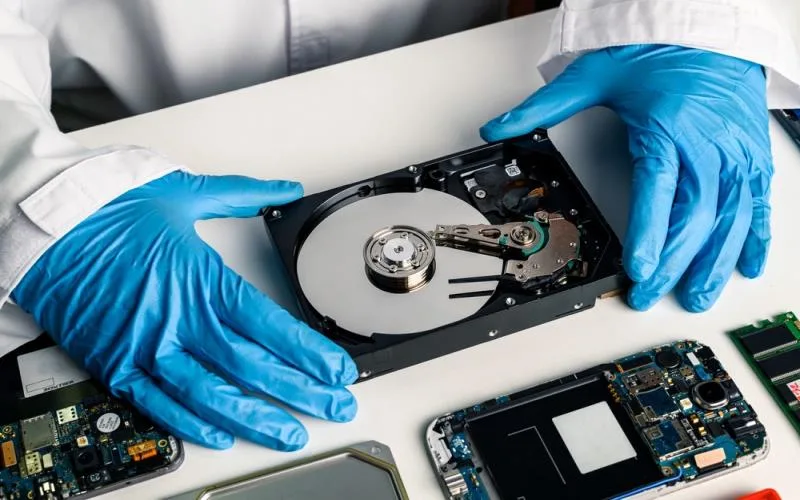Data recovery refers to the process of restoring data from damaged, failed, corrupted, or inaccessible storage media when it cannot be accessed normally.
In our digital age, data forms the backbone of both personal and professional lives — from precious family photos to crucial business documents, the importance of stored information has never been higher.
Common Data Loss Scenarios
It’s all too easy to mistakenly delete files or format a drive, resulting in potential data loss. Dropping a hard drive, or any kind of physical trauma, can lead to data becoming inaccessible. Software glitches, viruses, or malware can corrupt files and make them unreadable. Events such as floods, fires, or earthquakes can damage storage devices.
Factors to Consider Before Paying for Data Recovery
1. The significance of the lost data:
Personal memories, like photos and videos, hold emotional value and cannot be replaced. Essential business information can determine the success or failure of operations. Sensitive or irreplaceable data, such as research or unique creative works, can be devastating to lose.
2. Potential cost of recreating the lost data:
The time and effort to recreate data can be considerable. Financial implications can include lost revenue or the monetary cost of recreation.
3. Availability of backups:
Regularly backing up data is a safeguard against loss. If backups are available, restoration can be straightforward and less costly.
4. Cost of professional data recovery:
Pricing models vary, from a flat fee to an hourly rate. Hidden costs might include parts or shipping.
5. Success rate and reputation of the data recovery service:
It’s essential to choose a reputable service with a high success rate to ensure the best chance of data retrieval.
5. Potential risks of data recovery:
Inept recovery attempts can further damage the storage medium. There’s always a risk of breaching confidentiality, especially if sensitive data falls into the wrong hands.
DIY Data Recovery vs. Professional Services
There’s a plethora of software tools available for those who wish to venture into DIY data recovery. Tools like DiskInternals Partition Recovery, Recuva, Disk Drill, and TestDisk are popular options. They offer the best data recovery services, a user-friendly interface and guide users through the process of scanning and recovering files from various storage media.

When DIY might be appropriate
DIY data recovery is best suited for straightforward data loss scenarios
- Accidental deletions: Perhaps you’ve accidentally emptied the recycle bin or permanently deleted a file. DIY software can often retrieve these.
- Minor software errors: Sometimes, file structures get corrupted, making data seem lost, but software can often repair these errors.
- Recently formatted drives: If you’ve mistakenly formatted a drive but haven’t written new data over it, many DIY tools can help recover the old data.
Limitations and risks of DIY approaches
While DIY recovery software can be helpful, it comes with its set of challenges:
- Risk of Overwriting Data: The most significant danger of DIY data recovery is the risk of overwriting lost data, especially if the software is installed on the same drive where data is lost.
- Limited Recovery: Free or cheaper software versions may have limited data recovery capabilities.
- Complex Scenarios: DIY tools might not handle intricate data loss situations, like mechanical hard drive failures or severe data corruption.
- Further Damage: Without proper expertise, there’s a risk of causing more harm, rendering data permanently lost.
- No Guarantees: Recovery isn’t always guaranteed, and without proper knowledge, you might not achieve optimal results.
Benefits of seeking professional help
Opting for a professional data recovery service comes with multiple advantages:
- Expertise: Professionals possess a deep understanding of storage devices and data structures. They can handle a variety of scenarios, from logical to mechanical issues.
- Advanced Equipment: Many data recovery tasks, especially those involving physical damage, require specialized tools and environments, like clean rooms, to open and repair hard drives without risking further damage.
- Higher Success Rate: With their resources and expertise, professionals often boast higher recovery rates than DIY methods.
- Safety: Your data’s confidentiality and integrity are maintained. Reputable services often adhere to stringent data privacy protocols.
How professionals handle complex data recovery situations
When faced with challenging recovery situations, professionals employ a range of strategies:
- Assessment: The first step is a thorough diagnosis to determine the extent and type of damage.
- Clean Rooms: In cases of physical damage, professionals use clean rooms – specialized environments where airborne particles are controlled to prevent further damage to the storage media.
- Specialized Equipment: This includes disk imagers, which can read data at a granular level, or soldering stations for PCB (printed circuit board) repairs.
- Proprietary Software: Professionals often have their own custom software solutions developed for unique scenarios.
- Manual Recovery: In some extreme cases, professionals might manually reconstruct data bit by bit.
In essence, while DIY methods offer a quick and often less expensive route to data recovery, they’re not without risks. For vital or extensive data loss, or when dealing with physically damaged devices, professional services often offer the best chance at a successful recovery.
Prevention: A Worthwhile Investment
- Backup solutions range from cloud services to external hard drives.
- Setting automated, regular backups ensures up-to-date data preservation.
- Proper care can prevent many physical damages.
- Staying updated can prevent software corruption and protect against malware.
- Educating oneself about potential threats and precautions.
Conclusion
Each data loss scenario is unique, and individuals must weigh the costs and benefits of recovery. While there’s often a monetary cost associated with data recovery, the peace of mind that comes with retrieving irreplaceable data can be priceless.
For many, investing in professional data recovery is a small price to pay to reclaim vital personal or business data. Always consider the significance of the data, available alternatives, and the potential costs before making a decision.



